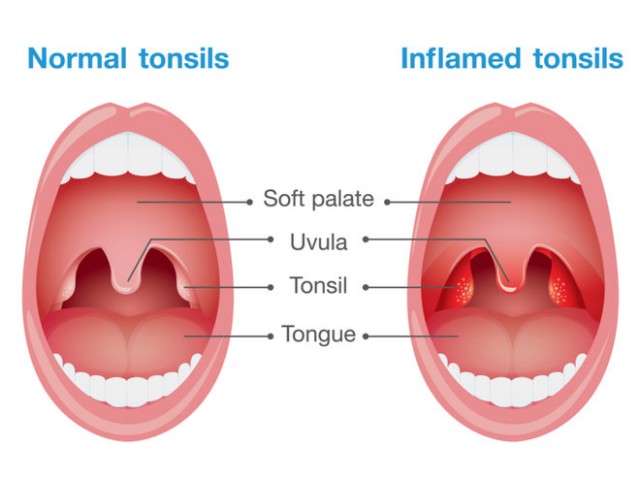108 Glen Osmond Road, Parkside

Tonsillitis is the inflammation of the tonsils. The tonsils are 2 small glands on either side of the throat. When a person has tonsillitis, their tonsils become inflamed, infected, and swollen. The tonsils play a key role in helping to protect the body against infection. This is especially important in young children, whose immune systems are still developing. The tonsils act as a barrier, trapping an infection and stopping it from spreading to other parts of the body. The infection may stay in the tonsils, causing tonsillitis. As a person gets older their immune system becomes stronger, and the body does not rely on the tonsils as much to fight infection. That’s why tonsillitis in more common in children.
Causes :
In most cases, around 80% of tonsillitis are caused by a virus. Many types of viruses can cause tonsillitis, including cold & flu viruses. These can spread easily from person to person through coughing or sneezing, hand contact, and direct contact with the virus on surfaces (e.g. door handles). Some cases of tonsillitis are caused by a bacterial infection, usually the streptococcus type of bacteria.
Symptoms :
When there is severe infection, the patient feels throat pain, headache, swelling in the nearby area, difficulty in swallowing food, etc, followed by fever.
Complications :
Ayurvedic view of Tonsillitis :
In Ayurveda, tonsillitis is related to Tundikeri or Galaayu, which is mainly caused by the accumulation of toxins in the body due to improper digestion and poor defense mechanisms by the immune system to counter the infection. All three doshas Vata, Pitta & Kapha get aggravated in the condition. Ayurveda considers the repeated infection and inflammation of the tonsils to be a cause of different types of ailments later in life. Therefore, Ayurveda treats the entire immune system thus eliminating any risk.
Causes of Tonsillitis/ Tundikeri according to Ayurveda:
Pathophysiology according to Ayurveda :
All the three doshas- Vata, Pitta, and Kapha are observed here. Due to indulging in above mentioned aetiological factors, Kapha dosha will get vitiated, and thus vitiated doshas circulate in Siras and get localized in Mukha Pradesh (oral cavity) as Urdhwanga is the prime seat of Kapha dosha. Thus, vitiated Kapha in association with other doshas results in the manifestation of Tundikeri.
Types of Tonsillitis/ Tundikeri according to Ayurveda :
Classification is based on the predominance of dosha and characteristic pain:
Vata- Pittaja- Tundikeri is associated with Toda and Doha (Pain & fever).
Kapha- Raktaja- Tundikeri associated with Sthoola Shotha, Trishna, Shvasa & Kasa (Large tonsil swelling with cough)
Line of treatment for Tonsillitis according to Ayurveda:
Herbal formulations used are :
Self-care tips :
The Ayurvedic treatment aims at treating the infection along with building up immunity aiming to eliminate the risk in the long term. The Ayurvedic herbs along with advice on diet and lifestyle help in eliminating inflammation and infection. For expert advice contact our Ayurvedic doctors Sandeep Kumar and Anupam Vasudeva at Life Line Ayurvedic Herbal Clinic to avoid further complicating the condition.
Disclaimer : Sandeep Kumar and Anupam Vasudeva are not GP, they have Ayurveda medical degree from India where it is considered equal to any other medical degree. This qualification is recognized in Australia by vetassess governing body as Complementary Health Therapists. Life Line Ayurvedic Herbal Clinic does not claim to cure a disease or terminal illness and does not create any unreasonable expectation of beneficial treatment. Ayurvedic medicines and treatments are generally considered to be safe but rarely may be associated with possible adverse reactions in individual cases. We recommend seeking urgent medical attention in the case of an adverse reaction. This website provides you with information. You must contact your Ayurvedic or another health professional before you apply them. Read More